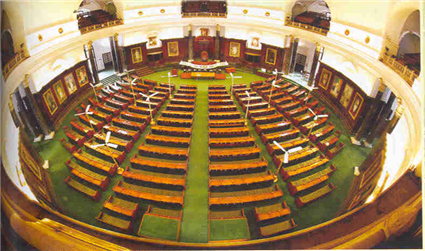
The Lok Sabha
 By Dr Adish C Aggarwala*
By Dr Adish C Aggarwala*
The Lok Sabha Secretariat has committed an error in disqualifying Congress leader Rahul Gandhi from membership of the Lok Sabha without referring the matter to the President of India under Article 103 of the Constitution of India and the opportunity of being heard was not provided to Rahul Gandhi.
Hence, the Notification of the Lok Sabha Secretariat will not stand the scrutiny of a competent Court if this notification is challenged by Rahul Gandhi.
While the Surat Chief Judicial Magistrate Court has done its duty by following the Constitution and legal precedents, the Lok Sabha Secretariat should have followed the procedure specified under Article 103 of the Constitution instead of summarily issuing a disqualification notification within a day of the judgment.
Also read: Counterpoint: What does Rahul Gandhi’s disqualification mean?
Even if, the present notification is quashed by the Court, it should be borne in mind that the Lok Sabha Secretariat is empowered to issue a show cause notice to Rahul Gandhi and then the matter be referred to the President of India and the President, after obtaining the opinion of the Election Commission, shall act according to such opinion.
Article 103 requires the matter of disqualification to be referred for the decision to the President of India and the President of India shall obtain the opinion of the Election Commission of India and shall act according to such opinion and the decision of the President of India shall be final.
It seems a fit case for Lok Sabha Secretariate to rescind Rahul Gandhi’s disqualification notification and instead follow the time-tested conditional principles of routing it through the President of India for further action.
It may respectfully be pointed out that the issue concerning the conviction and disqualification of Rahul Gandhi involves three Constitutional limbs and issues: One, the judiciary, in this case, the subordinate judiciary; two, the Lok Sabha Secretariat which represents the Parliament itself; and, three; right to free speech and the restrictions therein.
The Surat court verdict in the case underlines the Constitutional Right concerning the Right to Speech. We welcome it. The order against Rahul Gandhi merely underscores the importance of liberty to speak, but with responsibility. The Fundamental Right to speech is not unfettered and the Right has been tempered by restrictions. Every common man in general, political parties and public figures like Rahul Gandhi in particular, should be aware of that. If speeches are made with restrictions and responsibilities in mind, it will save a lot of national resources.
Hence all political leaders and public figures should deliver speeches with a sense of responsibility without offending the cherished feelings of anyone.
*Senior Advocate and chairman of All India Bar Association (AIBA). He is also a former vice chairman of Bar Council of India and the Supreme Court Bar Association. The views expressed represent that of AIBA.





